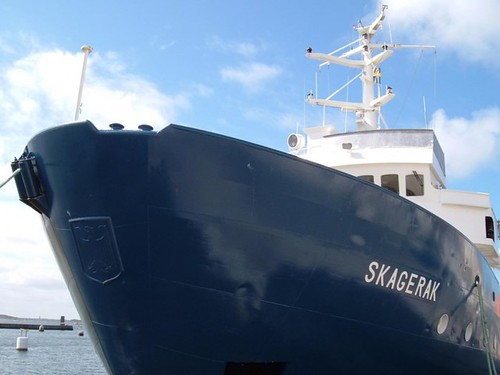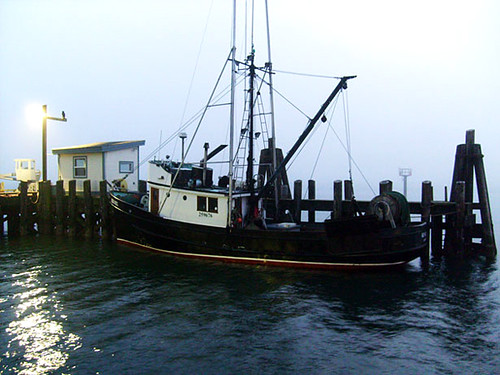Managing those testy American anglers...
I think I made somebody mad the other day. The somebody I made mad was a guy named Roy Crabtree. Roy has a very important title inside of NOAA, but quite frankly I am so sick of beauracrats like Crabtree that theirs personal opinion of the importance is somehow connected to titles they make up themselves, so I won't waste a single pixel telling you who he is, what his title is, or why he thinks he is so important that he makes random decisions, driven by his desire to
keep that title on his taxpayer-funded business cards. Crabtree is a friend of the fish and a friend of the global movement to govern us. His role is governing what we do to fish, but you get the idea. Roy is a government controller, and as such has a police force he can use to arrest you and put you in jail, or to take property that you've worked to own. Private property and private rights - those troublesome things written into an archaic document more than 200 years ago - are not something that Roy has on s agenda. Roy's agenda is called Agenda 21, and according that agenda, private property and the wealth-gathering that goes along with it are contrary to social justice. Social justice for who, one might ask. Social justice for fish? Social justice for the men and women that scout, hunt, harvest, and eat them? Social or economic justice for the thousands of related businesses touched by or touching the fishing industries? Or social and environmental justice for the likes of Roy Crabtree? I contend it is all about power. It is not all about fish, it is not about fisherman certainly, and it not about the environment. It is about personal and collective organizational power. Power to buy votes, and in turn the power to control elections.
Where do I start? I am a professional writer, and have been telling stories - and getting paid for them - for more than two decades. Three almost. I don't often find myself speechless; I can start with a blank piece of paper, decide what I want to tell the reader, tell it to them, and then tell them - in a paragraph or two (or a chapter) - exactly what it was I had just told them. That step-by-step approach is the textbook method of writing a book. You them what you are going to tell them, tell them what you want to tell them, and then tell them what you just told them. A prescription, if you will, for every technical writing project mankind has ever needed and ever will need. Try it. It will work for anything from an article about a great fishing knot or a book about shaving four points from your golf handicap. We have used the method to produce 500-page textbooks about how to use programs like Adobe Photoshop.

Doctor Roy Crabtree, the power behind the massive onslaught of regulations and behind-the-scenes forces controlling our lives, it is people like Crabtree we need to rid our government of. When asked if he had done mortality studies on the town of Madeira beach with the same fervor that now says we must protect tile fish, he rolled his eyes at me and said the "speech was over". I asked him the same question three more times. Have you done the report that the law requires you do, Crabtree? Who the hell do you think is paying your salary, you arrogant intellectual piece of nothing? You have to answer the question, Roy. Your butt is going to be seated before congress, and the PEW girls will not be able to protect you there. The days of Crabtree management will soon be over, doctor. The truth will set you free, and the truth about fishery management is the last thing you talk about at your taxpayer funded meetings. But it is coming. You remember that fat ass in the hot tub in the GFA meeting and taxpayer party in Las Vegas? You think we are gonna find any mis-steps at NOAA? You think any shady things have happened there? Just wait till September and the Magnuson hearings. Just you wait.
In 1976, a law was put before the House of Representatives called the Magnuson/Stevens Fishery management act. It quickly made it through the senate and was signed by the pen of President Richard Nixon. It was rewritten twice, with the last rewrite - the most devastating of all for the human element of the fishing formula - under the younger Busch. The fact that his UN friendly signature was on the document shoukdn't make anybody particularly comfortable. The last rewrite was the one that really hurt the fisher, though.
You see, as the law evolved, so too did the environmental movement. Anybody with a bit of sense can see that the government - whether it is the Greek government or the city council in most (but not all) city councils in your home town - are completely out of control. I live in a city that is committed to knocking down a perfectly good pier to replace it with "the Lens" - a $20 million dolle bubble over a vast piece of our fishy bay. You will not be able to fish there, of course. It will be a "protected zone". Three years ago, when I was called a conspiratorial nutcase for pointing out the basic premise of UN Agenda 21 as it relates to private property, and that marine Spacial zones were a way for a global government to take what is now public lands and ban our access to them in the name of animals we now hunt and harvest, I forecast projects like the Lens. And some of the world's leading fishery management scientists - the likes of doctor Ray Hilborn - presents solid evidence that they do nothing, and that the emergency, crisis approach to "overfishing" is driven more by blind fith than by science.
The Magnusson was meant to do wonderful things. It was meant to protect American waters from deep water bottom-trawlers arriving by the fleet from China, Russia, and every other nation on the earth capable of producing the increasingly popular "factory ships". Equipped with everything from the rakes that simply dragged the bottom, catching and killing everything unlucky enough to be living where it was used, to helicopter-landing pads, where supplies were brought in and injured workers transported to land-based hospitals. From the trawls to the decks to the processing machinery and into cans, the fish caught on the vessels was outside the control of American anglers, regulators, or law. Environmentalism was in relative infancy, and the law was seen by the already-active anti-fishing community as a poor move towards their true agenda, the elimination of commercial and recreational angling.
The MSA went on from there, though. Fishing was a uniquely American thing in many ways. And fish were identified as a national resource, best protected by a well-educated, centralized and organized government. The federal government, of course. Designed to protect fish, fisherman, and the resource they loved or lived with, the MSA, like a thousand other well-meaning laws, had teeth hidden deep inside it's mouth. Teeth we didn't realize were about to start biting the very people and industries it was meant to protect. Anglers.
Rewrites and definitions: the Magnusson/Stevens
The law started having problems right away. In case you do not know this yet, there is money in politics. Big, sickening, and corrupt money. Money and power that is passed hands, bank accounts, titles to beautiful homes, cars, airplane tickets, and summer houses in the Hamptons. Follow the money, and you follow the law. There were companies like Tyson foods and companies like Walmart that have coin on that table. The law was modified in 1996 and again in 2006. Do you fish? Do you eat fish? Do you care that the number of fish we are allowed to catch in the gulf of Mexico is roughly ten percent as many fish as we could catch fifteen years ago? You should. Do you even own now what defines a fish as being "overfished", and therefore under the anti-fishing control of men like Doctor Roy Crabtree, who, when I asked if mortality studies had been done on the town of Maderia Beach with as much fervor as he was presenting charts about the mortality of American Red Snapper, said I should stop making speeches. It was that comment, and how to describe the events under which the conversation between the doctor and me happened, that had left me speechless when I started writing this comment.

Bur worry not, readers and interested parties. My ability to talk has returned.
The South Atlantic Fishery Management Council
I call myself a member of the Tea Party, whatever that might be. Many of my friends - people I really respect - either roll their eyes when they hear me say that or "advise" me not to bring up the forbidden subject of politics in stuff I write. "Those articles will be on the Internet forever, Gary." they say. "In ten years somebody will be able to use it against you." Use what? My belief in the purity of that document called The Constitution?" That? The belief I share with many that a completely out-of-control federal government has been slowly but certainly shredding us of our personal rights? The belief that with each new destructive regulation something precious is being lost?
That member of the tea party also owns half of an online fishing magazine. And I went to a meeting the other night of the South Atlantic Fishery Management Council. The meeting was lead by a man that is far from a friend of fishing. A beauracrat more protective of his position and envisioned power then in the protection of any species. But Crabtree can bring fifty head-bobbing beauracrats, scientists, academia, and administration taxpaid head bobbers, but the truth is what it is. Regulators are too busy regulating to see the damage they are doing. It is time for the regulated to regulate the regulators.
It is time to remove doctor Roy Crabtree from his position of power. And to replace him with somebody that sees fisherman as being at least as important as the fish he is supposedly protecting. I you do the research on the number of finish being caught 20 years ago and what they - they, whoever the hell Crabtree thinks he is - have allow us to catch now. Who the hell are they anyway?
I asked him a question at that meeting that he refused to answer. We strongly recommend that you ask him yourself. The question is is this, and should serve as an open question to doctor roy Crabtree:
An open letter to Roy Crabtree
Doctor:
What was the American red snapper season in 1992, 2002, and 2012? In months open and seasons closed? And who could take how manu fish home to eat and share with friends and family members?
Also provide the same numbers for the top ten species you see as in need of regulatory protection during that same time period and which species you had control over that was limited to our capture and harvest over that time. Include changes made to a guide's ability to take fish home for their paying clients.
Can you show me how the decrease in the fish you allow us to catch has fixed or protected species? I need on-water numbers, doctor, not mathematical models done on computer. Real numbers of real fish.
When does this increasing regulatory pattern stop or even slow down? When will regulations not be rewuired at such crisis levels. You are now stopping us from taking tile fish. Can you draw a picture of perfect fishery management?
To protect fish from torture, catch and release fishing in Germany and sweden is now illegal. What is your personal stance on such draconian shutdowns? Are you in direct content with any individuals or organizations that were connected in any way to the acceptance and passage of that legislation?
Relative to the three decade take-reduction and season reduction imposed on our community by scientists, academics, and beauracrats like you, can I see the studies you are required by law to provide me as a journalist and citizen relative to the economic impact of your regulatory changes on one town? The city of Madeira beach. I will supply numbers, and I want to compare them to your required studies.
Gary Poyssick, publisher
I see your studies on biomass. And on fishing allocations, and on your allowing us to catch an additional 10,000 odd American Red Snapper this season. By emergency granting of your power to let us fish. Hve you done the studies you are required to do concerning the economic impact of your increasing and ever-expanding species shutdown?
I said it at that meeting the other night, doctor. You line up with people only who agree with you. Vast wealth is moved around 501c3s for global governance strategies like catch share and marine special zones. You know what is happening and you agree to be part of it. But ask yourself this question. What is the end game for our country if you get your way, animal rights activists? What is the end game of an America where it is illegal to catch a bluegill with a little boy and put it on a frying pan? Or putting a $250,000 Sportfishing boat on the edge of a school of black fin tuna? What is better for the civilization on the shoreline? The gray rooms of socialism, or the open oceans of the tuna boat? Making sure nobody hurts those poor helpless tuna takes away something on that expensive boat that is the same on an ancient fishing craft. Something magical and something free. Don't protect the fish and make the angler go extinct,





